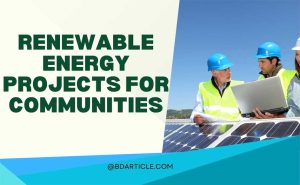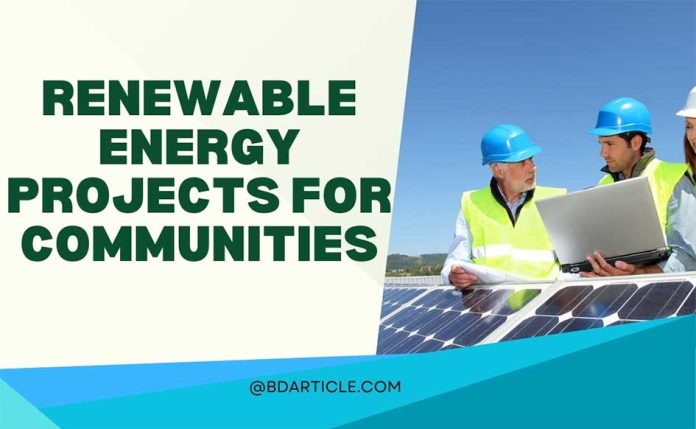In recent years, communities around the world have started embracing renewable energy projects as part of their journey toward sustainability. Renewable energy, which includes solar, wind, hydro, and geothermal power, is rapidly becoming a vital part of the energy landscape. Not only is it crucial for combating climate change, but it is also an opportunity for communities to achieve energy independence, reduce costs, and contribute to environmental conservation. Renewable Energy Projects for Communities are a powerful tool for empowering local populations, boosting economies, and paving the way for a cleaner future.

What Are Renewable Energy Projects For Communities?
Renewable energy projects for communities are initiatives that involve the generation and use of renewable energy sources on a local scale. These projects are designed to provide energy solutions that are sustainable, environmentally friendly, and economically beneficial for the community. From small-scale solar farms to larger wind turbine projects, these energy solutions can be tailored to fit the specific needs of a region or town.
One of the most significant advantages of these projects is their ability to reduce the reliance on fossil fuels, which are not only expensive but also harmful to the environment. Communities that invest in renewable energy can take control of their energy future, ensuring a reliable and cleaner source of power for generations to come.
Types of Renewable Energy Projects for Communities
When we talk about Renewable Energy Projects For Communities, we refer to a wide array of energy systems that harness natural, replenishable sources. Some of the most common renewable energy projects for communities include:
- Solar Energy Projects: Solar panels are a widely used and accessible form of renewable energy. Solar energy projects for communities can involve installing solar panels on homes, businesses, or large solar farms that feed energy directly into the local grid.
- Wind Energy Projects: Communities located in areas with high wind potential can benefit from wind energy projects. Wind turbines, both onshore and offshore, can generate substantial amounts of energy, contributing to local power generation.
- Hydropower Projects: For communities located near rivers or streams, small-scale hydropower plants can generate reliable and consistent energy. These systems can provide power to local populations without the environmental degradation caused by larger dams.
- Geothermal Projects: Geothermal energy is an excellent renewable energy source in areas with high geothermal activity. By tapping into the Earth’s natural heat, communities can generate electricity and provide heating for homes and businesses.
- Bioenergy Projects: Bioenergy projects use organic materials like agricultural waste, wood, or food scraps to produce electricity, heat, and even biofuels. These projects are especially beneficial in rural areas where agrarian waste is abundant.
Benefits of Renewable Energy Projects For Communities
- Environmental Impact: Renewable energy projects’ most significant benefit is their positive environmental impact. By using natural sources of energy, communities can reduce their carbon footprint and limit the harmful effects of climate change.
- Economic Advantages: Renewable energy projects also have the potential to create jobs and stimulate local economies. For example, building and maintaining wind turbines, solar farms, or bioenergy plants requires skilled workers, which in turn creates employment opportunities within the community.
- Energy Independence: Many communities rely heavily on external energy sources, which can be expensive and subject to fluctuating prices. Renewable energy projects offer the chance for energy independence, where communities can generate their power and protect themselves from rising energy costs.
- Cost Savings: Once renewable energy projects are installed, they typically have low maintenance costs, and many offer energy savings over time. For example, solar panels can save homeowners and businesses money on their electricity bills by providing a significant portion of their energy needs.
- Enhanced Resilience: Renewable energy projects can make communities more resilient to natural disasters and power outages. With decentralized energy systems, such as solar or wind power, communities can maintain access to energy even during emergencies.
- Social Benefits: Beyond the environmental and economic benefits, renewable energy projects can also bring communities closer together. As residents work together to implement energy projects, they often develop a stronger sense of community and shared purpose.
Challenges of Renewable Energy Projects For Communities
While the benefits of renewable energy projects are clear, there are also challenges that communities may face in their implementation:
- Upfront Costs: One of the biggest hurdles for communities looking to invest in renewable energy is the initial cost. Solar panels, wind turbines, and other renewable energy technologies require significant capital investment, which can be a barrier for smaller communities.
- Infrastructure and Storage: Renewable energy sources like solar and wind are intermittent, meaning they do not produce a constant supply of energy. Communities must invest in energy storage systems, like batteries, to ensure they have a steady power supply when the sun isn’t shining or the wind isn’t blowing.
- Technical Expertise: Building and maintaining renewable energy projects requires specialized knowledge. Communities may need to bring in external experts or invest in training local workers to ensure the long-term success of these projects.
- Regulatory and Policy Challenges: Navigating local, state, and federal regulations can be complex. Communities may face bureaucratic hurdles, zoning issues, or a lack of incentives that can delay or complicate the process of implementing renewable energy projects.
- Public Support: Renewable energy projects require broad community support to be successful. Educating the public about the benefits and feasibility of these projects is crucial to garnering support and overcoming opposition.
How to Get Started with Renewable Energy Projects For Communities
Starting a renewable energy project for your community may seem daunting, but with the right approach, it’s entirely feasible. Here are some steps to consider:
- Assess Local Energy Needs: Before embarking on a renewable energy project, it’s essential to evaluate your community’s specific energy needs. What is the current energy consumption? What renewable energy sources are available locally?
- Conduct Feasibility Studies: Feasibility studies will help determine the most appropriate renewable energy solutions for your community. A professional energy audit can give you valuable insights into the potential of solar, wind, or other renewable sources.
- Build Partnerships: Community-driven projects often require collaboration. Partnering with local governments, private companies, and non-profit organizations can help secure funding, technical expertise, and public support.
- Seek Funding and Incentives: Many governments offer grants, incentives, and subsidies to help offset the costs of renewable energy projects. Look into local, state, and federal programs that could help fund your project.
- Engage the Community: Public support is critical to the success of renewable energy projects. Host town hall meetings, educational workshops, and informational campaigns to help residents understand the benefits of renewable energy and how they can get involved.
Example Case: Solar Energy for Rural Communities
In rural areas where access to centralized electricity grids may be limited, solar energy offers a practical and scalable solution. Communities like those in rural India and Africa have embraced solar projects to provide reliable power to remote villages. These solar microgrids power homes, schools, and healthcare centers, reducing dependency on costly and polluting diesel generators.
By adopting solar energy, these communities not only gain access to cleaner energy but also stimulate local economies by creating jobs in installation, maintenance, and training.
Looking Ahead: The Future of Renewable Energy Projects For Communities
As renewable energy technologies continue to evolve and become more affordable, the potential for renewable energy projects in communities grows. With advances in battery storage, smart grid technology, and energy efficiency measures, renewable energy will continue to play a pivotal role in shaping the future of energy.
For those looking to make environmentally-conscious decisions in their daily lives, here are 10 Brilliant Zero-Waste Grocery Shopping Tips that can complement your community’s renewable energy initiatives by reducing your carbon footprint.
Conclusion
Renewable Energy Projects for Communities are not just a trend but a vital step toward building a sustainable future. With environmental, economic, and social benefits, these projects offer a clear path for communities to take control of their energy needs and contribute to a healthier planet. Whether through solar, wind, or other renewable energy sources, communities are increasingly recognizing the importance of sustainable energy solutions. By embracing these initiatives, we can create a future where clean energy is accessible to all.
For more about renewable energy initiatives, check out resources from the Department of Energy and EnergySage.
# Renewable_Energy #Solar_Energy #Wind_Power

